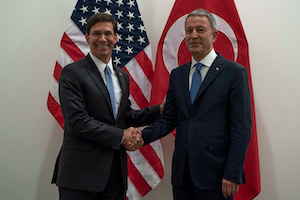Will COVID-19 Restrain Erdoğan's Syria Ambitions?
By Aykan Erdemir and Luc Sasseville
April 27, 2020
Turkish President Recep Tayyip Erdoğan’s ambitions in Syria have resulted in a two-pronged intervention, as Ankara targets the Bashar al-Assad regime in the war-torn country’s northwest and the Kurdish-led Syrian Democratic Council in the northeast. The coronavirus pandemic, along with Turkey’s economic crisis, jihadist attacks against Turkish forces in Idlib, and infighting among Turkish proxies will all pose obstacles to Erdoğan’s plans in Syria. It is, however, far from certain that these challenges will have a restraining effect on the foreign and security policy of the Turkish regime.
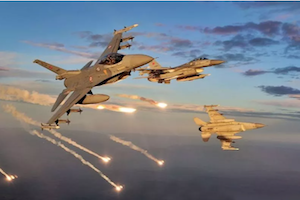
Turkey's In-between State of War and Peace with Russia
By Michaël Tanchum
March 25, 2020
On March 15, 2020, Turkey and Russia conducted their first joint patrol along the M-4 highway in Syria's Idlib province, implementing the terms a ceasefire accord that ended the direct military confrontation between Turkey and Russia. Ankara will prioritize avoiding further confrontation and cooperate with Moscow in order to consolidate Turkey's position in northern Syria. The degree to which Moscow reciprocates Turkey's gestures in Idlib will be the measure of how much Moscow is able and willing to accommodate Turkey's interests in northern Syria.
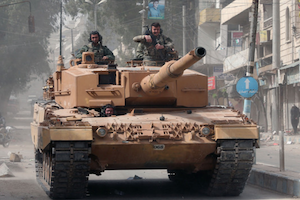
The Meaning and End of Turkey-Russia Cooperation in Syria
By Micha’el Tanchum
February 20, 2020
The Turkey-Russia relationship is in the midst of a major reset. The outbreak of hostilities in Syria's Idlib province has left thirteen Turkish soldiers dead and seven Turkish military posts under siege by Russian-backed Syrian government forces. Prior policy convergences between Turkey and Russia had raised speculation about the prospect of a Turkish-Russian strategic partnership dominating the security architecture on Europe's southern borders. However, Ankara seems to have overplayed its hand in what is fundamentally a transactional relationship with Moscow. A total rupture in Turkish-Russian cooperation is unlikely, even in the event of a Turkish counter-offensive. However, Russia's reduced cooperation with Turkey will likely result in Russia's further development of more robust strategic partnerships with Turkey's rivals – the United Arab Emirates and Saudi Arabia.
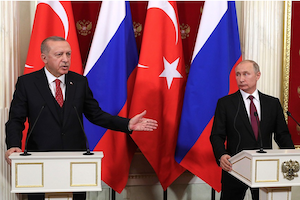
After Ten Days that Shook Syria: Turkey's Dependence on Russia Reaffirmed
By Cengiz Çandar
November 5, 2019
Turkey’s intrusion into northeastern Syria will have far-reaching consequences for Turkey, the balance of power in Syria and in the Middle East. The Rojava invasion also leaves a durable imprint on international relations at a global scale. It has left the United States in a weaker position, while Russia has strengthened its grip on Syria. Turkey’s dependence on Russia has been reaffirmed. The Russo-Turkish partnership in Syria may not prove long-lived since Moscow and Ankara have different, indeed fundamentally irreconcilable political priorities. It is unlikely that Turkey, dependent on the acquiescence of Russia and with an ailing economy, will be able to establish a permanent military presence on Syrian territory.
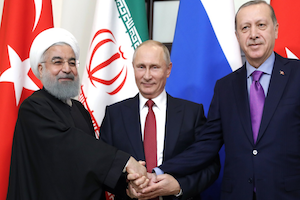
Syrian Safe Zone Moves U.S.-Turkey Relationship Beyond Kobani
By Micha’el Tanchum
August 29, 2019
With Turkey poised for a cross-border invasion to clear northeastern Syria of U.S.-aligned Kurdish forces, Washington and Ankara announced an agreement on August 7, 2019 to jointly create and patrol a safe zone in the region, averting the possibility of the two NATO allies exchanging fire. Far from a climb down for Ankara, the agreement enables Turkey to achieve its minimal goals, and probably more. At the same time, it provides a significant yet delicate reset opportunity for Turkey-U.S. relations that have been severely strained since the U.S.-Kurdish military partnership than began with Battle of Kobani.
